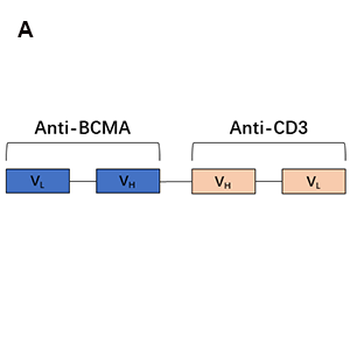You have no items in your shopping cart.
Cart summary
Item 1 of 2
Item 1 of 2
Anti-BCMA bispecific antibody(DM4)
Catalog Number: orb1826963
| Catalog Number | orb1826963 |
|---|---|
| Category | Antibodies |
| Description | Anti-BCMA bispecific antibody(DM4) |
| Species/Host | Rabbit |
| Clonality | Monoclonal |
| Clone Number | DM4 |
| Tested applications | FC |
| Reactivity | Human |
| Isotype | Rabbit scfv |
| Dilution range | Flow Cyt 1:100; MMTumor cell killing |
| Conjugation | Unconjugated |
| Target | BCMA |
| UniProt ID | Q02223 |
| Storage | Maintain refrigerated at 2-8°C for up to 2 weeks. For long term storage store at -20°C in small aliquots to prevent freeze-thaw cycles. |
| Alternative names | TNFRSF17 Read more... |
| Note | For research use only |
| Application notes | Lyophilized from sterile PBS, pH 7.4. Normally 5 % - 8% trehalose is added as protectants before lyophilization. Please see Certificate of Analysis for specific instructions of reconstitution. |
| Expiration Date | 12 months from date of receipt. |

The basic principle of BiTE cell killing assay. The BiTE molecule can effectively bring T cells to tumor target cells and stimulate tumor cell killing activity of T cells.

A: The scheme of Anti-BCMA BiTE molecule. B: Tumor cell killing assay. NCI-H929 cells (stably transfected with luciferase), were incubated with freshly isolated human PBMC, and different concentration of BiTE antibodies constructed from rabbit Anti-Human BCMA/TNFRSF17 Clone DM4 (red line), or BB2121 originated huC11D5.3 clone (blue line) or a no BCMA binding clone as negative control (black line). After 48hrs incubation, the viable NCI-H929 tumor cells were measured by luciferase activity assay.
Biotinylated Anti-BCMA bispecific antibody(DM4) [orb2322202]
FC
Human
Rabbit
Monoclonal
Unconjugated
10 μg, 50 μg, 100 μg, 500 μgPE-conjugated Anti-BCMA bispecific antibody(DM4) [orb2669548]
FC
Human
Rabbit
Monoclonal
Unconjugated
100 T



